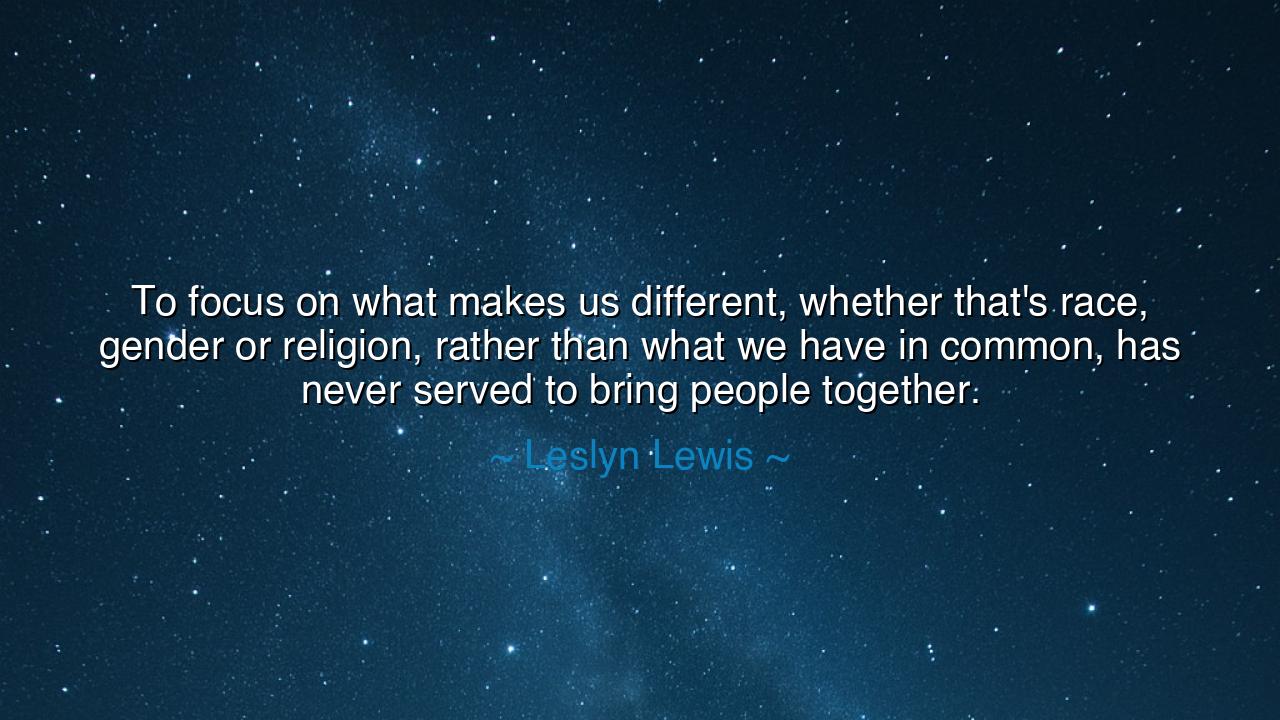
To focus on what makes us different, whether that's race, gender
To focus on what makes us different, whether that's race, gender or religion, rather than what we have in common, has never served to bring people together.






Hear these words of Leslyn Lewis, spoken with the gravity of one who has seen the divisions of the world: “To focus on what makes us different, whether that's race, gender or religion, rather than what we have in common, has never served to bring people together.” This utterance is not only a reflection on the present age but an echo of eternal wisdom, for from the dawn of time humanity has been torn between the impulse to divide and the longing to unite. The heart knows its kinship with all others, but the mind, clouded by pride, too often seeks to draw lines of separation.
For consider this: when we fix our gaze upon differences, we plant seeds of suspicion. We say, “This man is not like me,” and already a wall is rising. We say, “This woman’s faith is foreign,” and already mistrust takes root. Yet beneath the surface, the truth shines like a buried jewel: we all hunger, we all hope, we all fear the shadow of loss and yearn for the light of joy. Our common humanity is greater than any garment of race, gender, or creed we wear, and only when we remember this do we begin to walk the road of peace.
History itself testifies to the truth of Lewis’ words. Recall the story of Nelson Mandela, who, after long years in prison, emerged not with vengeance but with vision. South Africa had been torn apart by the cruel chains of apartheid, a system built upon difference, upon the lie that one race was less than another. Yet Mandela did not feed the flames of division. Instead, he chose to build upon unity, calling black and white alike to see themselves as one nation. His forgiveness, his insistence on common ground, became the bridge that kept a country from devouring itself in bloodshed.
Yet there are darker tales as well, where the focus on difference led only to ruin. The wars of religion in Europe, where Catholic and Protestant slaughtered each other for generations, left nothing but ash. Did it matter in the end who held the “right” doctrine, when villages burned and families starved? In the obsession with religious difference, they forgot that they all prayed, all wept, all sought the same divine comfort. Lewis’ words shine here with prophetic clarity: such focus has never brought people together—it has only driven them further apart.
But let us not imagine that this lesson belongs only to kings and nations. It belongs also to us, in our homes, our workplaces, our friendships. When we look at another and first see their difference, we close our hearts before a single word is spoken. Yet when we search for the shared, we find kinship where we least expected it. The stranger on the bus, the neighbor across the street, the co-worker of another faith—all carry stories and longings not unlike our own. To recognize this is to dismantle walls and to sow peace.
The lesson, then, is as clear as the morning sun: unity is born not from difference but from common ground. This does not mean we must erase our identities, nor silence the beauty of diversity. Rather, it means that diversity must never become a sword. Let it be instead a chorus, many voices singing one song of shared humanity. We must begin each encounter not by asking, “How is this person unlike me?” but, “What do we share?” From there, understanding grows, and through understanding, true fellowship is born.
So, children of the future, let this be your practice: in your speech, highlight what binds you to others; in your listening, seek the echo of your own heart in the voice of your neighbor; in your actions, strive always to unite, never to divide. Remember the wisdom of Lewis: when we obsess over difference, we scatter; when we honor commonality, we gather. And to gather, to stand as one, is the highest calling of humankind.
Thus, pass down this truth as a torch for generations: the divisions of race, of gender, of religion, are but garments of the body and mind. Beneath them, the soul is one, eternal, unbroken. To see this clearly is to heal the world. To live it daily is to make that healing real.






AAdministratorAdministrator
Welcome, honored guests. Please leave a comment, we will respond soon